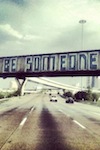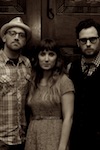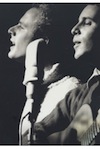 In my writing about my friend, I embellished certain details. I filled in the holes. And as a result, if I’m honest, I’m not sure which parts of the story are true, as in truly happened, and which parts I’ve added, piece by piece, over the years. Was it my need to remember that built this parallel between his eyes and the radio? Did we really smoke pot on a park bench, en plein air, as I’ve so often recalled, or was it cigarettes? Did he hold my hand during the movie we watched together, or did I dream that, too?
In my writing about my friend, I embellished certain details. I filled in the holes. And as a result, if I’m honest, I’m not sure which parts of the story are true, as in truly happened, and which parts I’ve added, piece by piece, over the years. Was it my need to remember that built this parallel between his eyes and the radio? Did we really smoke pot on a park bench, en plein air, as I’ve so often recalled, or was it cigarettes? Did he hold my hand during the movie we watched together, or did I dream that, too?
 In that first class all I could think about were Madonna’s biceps. It was the late 1990s, and Madonna had recently become as famous for her toned physique (attributed to her recent interest in yoga) as for her music. As I looked at myself in the mirror of the studio, awkwardly trying to follow the instructor’s gentle guidelines, I wondered if Madge’s muscle tone would be a happy by-product of my journey into health. “Bring your attention to the breath,” the instructor said, while gently lifting my hips, which were already trembling from exertion. Madonna, her biceps, and my own body scampered away from my attention, as I shifted that attention to my breath. Inhale. Exhale. Inhale. Exhale. On my way home on the subway, faced with the mild anxiety that always seemed to accompany me into cramped spaces, I tried to do the same. Inhale. Exhale. Inhale.
In that first class all I could think about were Madonna’s biceps. It was the late 1990s, and Madonna had recently become as famous for her toned physique (attributed to her recent interest in yoga) as for her music. As I looked at myself in the mirror of the studio, awkwardly trying to follow the instructor’s gentle guidelines, I wondered if Madge’s muscle tone would be a happy by-product of my journey into health. “Bring your attention to the breath,” the instructor said, while gently lifting my hips, which were already trembling from exertion. Madonna, her biceps, and my own body scampered away from my attention, as I shifted that attention to my breath. Inhale. Exhale. Inhale. Exhale. On my way home on the subway, faced with the mild anxiety that always seemed to accompany me into cramped spaces, I tried to do the same. Inhale. Exhale. Inhale.
 I had thought that this Catholic Mass would be so very different from the evangelical style of worship I was trying to take a break from. And I’d hoped, though I’d hardly admitted it to myself, that I might feel differently here, among the pillars and marble.
I had thought that this Catholic Mass would be so very different from the evangelical style of worship I was trying to take a break from. And I’d hoped, though I’d hardly admitted it to myself, that I might feel differently here, among the pillars and marble. But too much of it was familiar — the anemic guitar, the warbly singers, the optimistic lyrics. Sitting uncomfortably among the singing believers a burn of anxiety scrambled up my esophagus. I was irritated. The air conditioning irritated me. The music irritated me. The congregation irritated me. And my headache showed no signs of abating. Communion was coming, I knew that much from reading ahead in the program. I began to plan my escape.
 The artistic work of a life, or the life of an artist, is about the doing of the work, the going of the work — the writing of this essay, the singing of this song. The audience, the outcome, the success or failure of that work cannot be a consideration in the making of it or we are doomed. Doomed to rely on formulas, to pander to the invisible critic in our heads.
The artistic work of a life, or the life of an artist, is about the doing of the work, the going of the work — the writing of this essay, the singing of this song. The audience, the outcome, the success or failure of that work cannot be a consideration in the making of it or we are doomed. Doomed to rely on formulas, to pander to the invisible critic in our heads. Matt and I suddenly found ourselves writing songs we couldn’t play in church. Songs that would fit better in a bar or a club — venues we had started playing when we were too young to drink in them.
Matt and I suddenly found ourselves writing songs we couldn’t play in church. Songs that would fit better in a bar or a club — venues we had started playing when we were too young to drink in them.The songs we were writing weren’t necessarily risqué, but they were more about eros than agape — more focused on the divine in human love than the love of the Divine.
 My parents almost never went out alone together. They smiled giddily as they gave Jane instructions about dinner and bedtime. I paid attention. My father put his hand on my mother’s back as he opened the front door and ushered her out. Something important was happening in this moment, and it had everything to do with two fuzzy looking singers, one strumming a guitar worn high across his chest.
My parents almost never went out alone together. They smiled giddily as they gave Jane instructions about dinner and bedtime. I paid attention. My father put his hand on my mother’s back as he opened the front door and ushered her out. Something important was happening in this moment, and it had everything to do with two fuzzy looking singers, one strumming a guitar worn high across his chest. My conversion was real, but it divided us. I had no finesse in my clumsy attempts at evangelism, but I ached for him to join me, to understand. I was baptized on Coney Island in a lightning storm, and ever faithful, he stood on the beach and watched, hands dug deep in the pockets of his Levi’s. I knew he wrestled with the turn I’d taken, but we stopped talking about it. We suddenly got polite.
My conversion was real, but it divided us. I had no finesse in my clumsy attempts at evangelism, but I ached for him to join me, to understand. I was baptized on Coney Island in a lightning storm, and ever faithful, he stood on the beach and watched, hands dug deep in the pockets of his Levi’s. I knew he wrestled with the turn I’d taken, but we stopped talking about it. We suddenly got polite.













